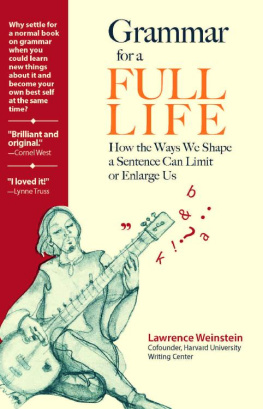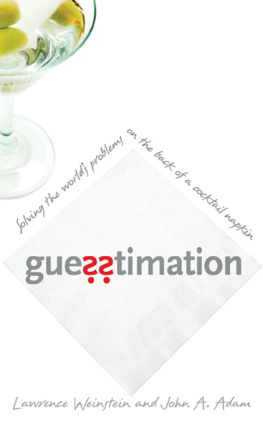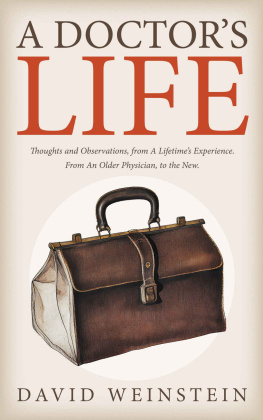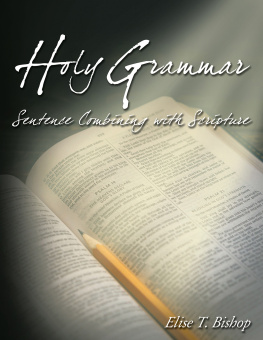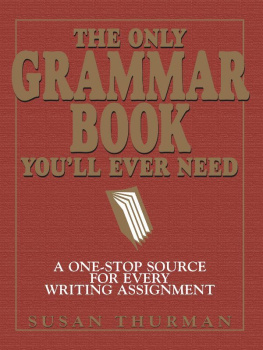Lawrence Weinstein - Grammar for a Full Life: How the Ways We Shape a Sentence Can Limit or Enlarge Us
Here you can read online Lawrence Weinstein - Grammar for a Full Life: How the Ways We Shape a Sentence Can Limit or Enlarge Us full text of the book (entire story) in english for free. Download pdf and epub, get meaning, cover and reviews about this ebook. year: 2020, publisher: Lexigraphic Publishing, genre: Romance novel. Description of the work, (preface) as well as reviews are available. Best literature library LitArk.com created for fans of good reading and offers a wide selection of genres:
Romance novel
Science fiction
Adventure
Detective
Science
History
Home and family
Prose
Art
Politics
Computer
Non-fiction
Religion
Business
Children
Humor
Choose a favorite category and find really read worthwhile books. Enjoy immersion in the world of imagination, feel the emotions of the characters or learn something new for yourself, make an fascinating discovery.
- Book:Grammar for a Full Life: How the Ways We Shape a Sentence Can Limit or Enlarge Us
- Author:
- Publisher:Lexigraphic Publishing
- Genre:
- Year:2020
- Rating:3 / 5
- Favourites:Add to favourites
- Your mark:
- 60
- 1
- 2
- 3
- 4
- 5
Grammar for a Full Life: How the Ways We Shape a Sentence Can Limit or Enlarge Us: summary, description and annotation
We offer to read an annotation, description, summary or preface (depends on what the author of the book "Grammar for a Full Life: How the Ways We Shape a Sentence Can Limit or Enlarge Us" wrote himself). If you haven't found the necessary information about the book — write in the comments, we will try to find it.
Grammar for a Full Life: How the Ways We Shape a Sentence Can Limit or Enlarge Us — read online for free the complete book (whole text) full work
Below is the text of the book, divided by pages. System saving the place of the last page read, allows you to conveniently read the book "Grammar for a Full Life: How the Ways We Shape a Sentence Can Limit or Enlarge Us" online for free, without having to search again every time where you left off. Put a bookmark, and you can go to the page where you finished reading at any time.
Font size:
Interval:
Bookmark:


Grammar for a Full Life
How the Ways We Shape a Sentence Can Limit or Enlarge Us
Lawrence Weinstein

Published by Lexigraphic Publishing, Cambridge, Massachusetts
Copyright 2020 Lawrence Weinstein, All rights reserved.
No part of this publication may be reproduced, stored in a retrieval system, or transmitted in any form or by any means, electronic, mechanical, photocopying, recording, scanning, or otherwise, except as permitted under Section 107 or 108 of the 1976 United States Copyright Act, without the prior written permission of the Publisher. Requests to the Publisher for permission should be addressed to Permissions Department, Lexigraphic Publishing, 17 Gurney St. #2, Cambridge, MA 02138.
Limit of Liability/Disclaimer of Warranty: While the publisher and author have used their best efforts in preparing this book, they make no representations or warranties with respect to the accuracy or completeness of the contents of this book and specifically disclaim any implied warranties of merchantability or fitness for a particular purpose. No warranty may be created or extended by sales representatives or written sales materials. The advice and strategies contained herein may not be suitable for your situation. You should consult with a professional where appropriate. Neither the publisher nor author shall be liable for any loss of profit or any other commercial damages, including but not limited to special, incidental, consequential, or other damages.
Cover Design: Ayman Alalao
Interior Design and Layout: Marie Stirk
Cover Illustration and Drawings: Juliana Duclos
Publishers Cataloging-In-Publication Data
(Prepared by The Donohue Group, Inc.)
Names: Weinstein, Larry, 1948- author.
Title: Grammar for a full life : how the ways we shape a sentence can limit or enlarge us / Lawrence Weinstein.
Description: Cambridge, MA : Lexigraphic Publishing, [2020] | Includes bibliographical references and index.
Identifiers: ISBN 9781734692709 (paperback) | ISBN 9781734692716 (ePub) | ISBN 9781734692723 (Kindle)
Subjects: LCSH: English languageGrammarPsychological aspects. | Expression (Philosophy)
Classification: LCC PE1398.P79 W45 2020 (print) | LCC PE1398.P79 (ebook) | DDC 425.9dc23
To tell how near a soul has come to being
fully realized, the sign is speech.
NACHMAN OF BRATZLAV
To Dianes memory and the live Suzanne.
The limits of my language mean the limits of my world.
LUDWIG WITTGENSTEIN
W hen my devoted wife, Diane Weinstein, was still livingand avidly contributing her input on the first version of this bookI had a cockeyed dream one night in which she played a crucial part.
In that dream, dinner guests of ours were going for their coats and readying to leave when Diane suddenly came out of the kitchen holding an oversized pot by two handles and chiding me, saying, You forgot to serve the alphabet soup.
At these words, I turned red, sensing the enormity of my omission. I dutifully corralled a few bewildered guests back to our dinner table.
Those few sat right down, picked up spoons, and stared for a moment at what lay in front of them: an engrossing mix of letters and punctuation marks circulating freely in their bowls. They used their spoons to have some wary sips of the dish.
Then, in no time whatsoever, two or three of them pronounced this soup good for a person, more life-giving than wed imagined, etcetera.
As soon as I woke from my dream, I knew that it was actually about this book. The dream had been a ploy by my unconscious to reassure me of the books potential worth to future readers.
The boost to my morale could not have been timed better. Id been getting skittish about going public with this work of mine, so dear to me. In a real sense, I felt tempted just to let it cool and be forgotten in our kitchenand Diane seemed to know that.
A grammar book for enhancing human spirit? As any skeptic worth his salt would say, give me a break. In the minds of a majority of people, that word grammar is about as vibrant with promise of a better life as the words dry pedantry.
How many readers could there be whod entertain the claim that someone can become a fuller person by such means as cutting back on exclamation marks?
Here then, briefly, is the story of how this collection of essaysthis alphabet soup of minecame into existence.
During my own early years of teaching writing, I, too, would have thought it laughable to pen a book suggesting that humanitys short list of practices for hastening personal growth be expanded beyond meditation, yoga, and the martial arts to include achieving more variety in sentence length. Like my colleagues at both Harvard University and Bentley University, I viewed grammar strictly in the light of its well-established basic function: clear communication. A randomly sequenced row of words like hand rake me you that would is gibberishwhereas the grammatical, punctuated sentence Would you hand me that rake? gets the job done.
That was grammars quite substantial gift to usbut its only gift, insofar as I could tell.
With times passage in the classroom, though, I took note of something curious: Each of my hundreds of students had a unique grammatical profile. In fact, the variation was striking.
One class member never used a question markor even just a hedging phrase or clausebut would use italics and intensifiers (like very , without doubt ) freely. Another stood out for inserting the occasional parenthesis or dash as a chatty, conversational touch. A third wrote sentences so long they gave one the impression that she simply couldnt bear to part with her wide-ranging trains of thought, while a fourth wrote timid sentences of fewer than a dozen words.
What is more, these students different grammar choices seemed to correspond to their diverse personalities, their distinct ways of understanding and dealing with life.
Then, I stumbled on the writings of linguist Benjamin Lee Whorf. Whorf was looking at the differences between whole languagessuch as between English as a whole and Hopi as a wholenot between my students types of English prose, but I began to wonder if his central insight about whole (that is, national or standard) languages applied to all those private languages, as well.
According to Whorf, any language will do more than enable its speakers to convey their thinking to each other: It will also somewhat mold their thinking. Whorf argued that, by making certain thoughts easier to express than others, a language helps determine what one thinks and feels in the first place. In English, for example, we have tenses that separate the present from the pastthat put the past behind us, in effect, implying it will never come againand most of us who think in English therefore try not to waste time; we move frenziedly. By comparison, the Hopi Indians Whorf studied, whose management of tense implied that every thing that ever happened still is, had less anxiety than most of us do and led more measured lives. A language, Whorf believed, can contribute either to neuroses (his term) or to more expansive, adaptive ways of thinking and being.
I asked myself, Could the same be said of each of the distinctive tongues I had been hearing within English? Could the variations from one English speaker to the next be linked to different ways of thinking and living, not all of which are equally likely to foster well-being? If so, that seemed to be worth knowing, since making some few tweaks to ones persistent set of grammar practices might, then, alter ones time spent on Earth in consequential ways.
Next pageFont size:
Interval:
Bookmark:
Similar books «Grammar for a Full Life: How the Ways We Shape a Sentence Can Limit or Enlarge Us»
Look at similar books to Grammar for a Full Life: How the Ways We Shape a Sentence Can Limit or Enlarge Us. We have selected literature similar in name and meaning in the hope of providing readers with more options to find new, interesting, not yet read works.
Discussion, reviews of the book Grammar for a Full Life: How the Ways We Shape a Sentence Can Limit or Enlarge Us and just readers' own opinions. Leave your comments, write what you think about the work, its meaning or the main characters. Specify what exactly you liked and what you didn't like, and why you think so.

